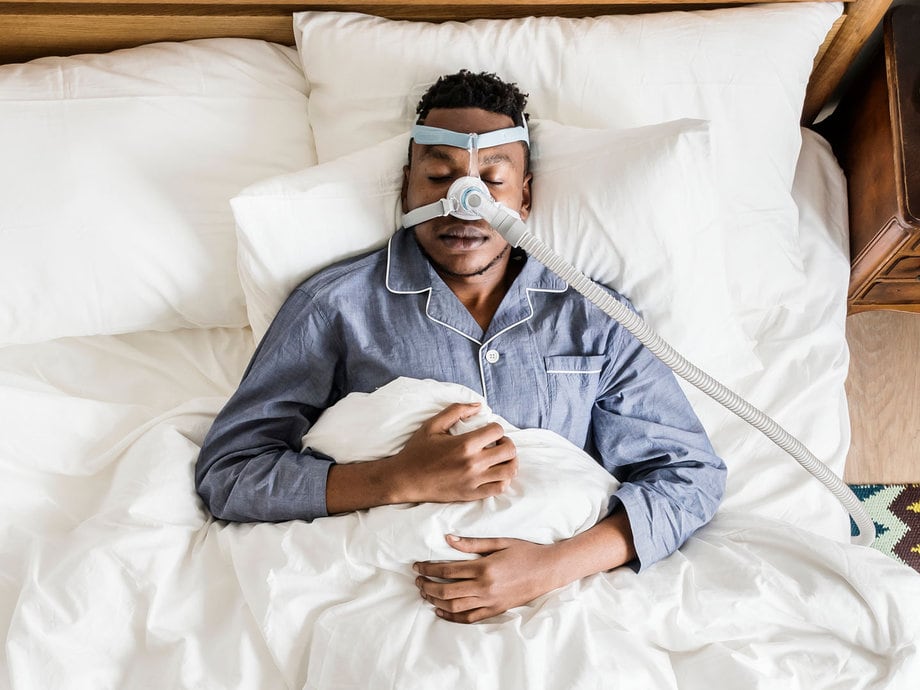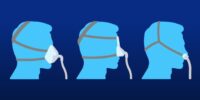Can Sleep Apnea Be Linked To Hormonal Imbalances?

Sleep apnea is a common sleep disorder characterized by pauses in breathing or shallow breaths during sleep. It affects millions of people worldwide and can have significant impacts on overall health and quality of life.
While the exact cause of sleep apnea is not fully understood, research suggests that there may be a link between sleep apnea and hormonal imbalances. Hormones play a crucial role in regulating various bodily functions, including sleep-wake cycles, metabolism, and the respiratory system.
Disruptions in hormone levels, such as those seen in conditions like hypothyroidism or polycystic ovary syndrome (PCOS), may contribute to the development or exacerbation of sleep apnea. Understanding the connection between sleep apnea and hormonal imbalances is essential for effective diagnosis, treatment, and management of both conditions.
This article will explore the current research on this topic, the impact on overall health, available treatment options, and future considerations for further investigation.
Key Takeaways
- Sleep apnea and hormonal imbalances have a complex and bidirectional relationship.
- Hormonal imbalances can contribute to the development and severity of sleep apnea.
- Sleep apnea can disrupt the production and regulation of hormones, impacting overall health.
- Medical interventions for sleep apnea and hormonal imbalances include CPAP, oral appliances, and hormone replacement therapy (HRT).
Understanding Sleep Apnea
Sleep apnea is a sleep disorder characterized by pauses in breathing or shallow breathing during sleep, which can lead to fragmented and poor quality sleep.nnIt is estimated that around 25 million adults in the United States suffer from sleep apnea.
There are three main types of sleep apnea:
- Obstructive sleep apnea (OSA), caused by a blockage of the airway during sleep.
- Central sleep apnea (CSA), occurs when the brain fails to send the proper signals to the muscles that control breathing.
- Complex sleep apnea syndrome (CSAS), a combination of both OSA and CSA.
Sleep apnea is often associated with various health issues, such as cardiovascular disease, obesity, diabetes, and cognitive impairment.
Treatment options include lifestyle changes, continuous positive airway pressure (CPAP) therapy, and surgery.
The Role of Hormones in the Body
This discussion will provide an overview of hormonal imbalances and their impact on health.
Hormones play a crucial role in various bodily functions and maintaining homeostasis.
When there is an imbalance in hormone levels, it can lead to a wide range of health issues, affecting both physical and mental well-being.
Overview of Hormonal Imbalances
Hormonal imbalances can have a significant impact on various bodily functions and systems. These imbalances occur when there is either too much or too little of a particular hormone in the body. Hormones play a crucial role in regulating sleep patterns, metabolism, mood, and overall health.
Sleep apnea, a condition characterized by pauses in breathing during sleep, has been linked to hormonal imbalances. Specifically, imbalances in hormones such as cortisol, insulin, and leptin have been associated with sleep apnea.
Cortisol, often referred to as the stress hormone, helps regulate sleep-wake cycles. Insulin, responsible for regulating blood sugar levels, can affect sleep quality when imbalanced. Leptin, a hormone that controls appetite and weight, has also been found to be disrupted in individuals with sleep apnea.
Understanding the relationship between hormonal imbalances and sleep apnea can aid in the development of targeted treatment approaches for this condition.
Impact of Hormonal Imbalances on Health
The intricate balance of hormones in the body has a profound impact on various aspects of overall health and well-being. Hormonal imbalances can disrupt this delicate equilibrium and lead to a range of health issues.
For instance, an imbalance in thyroid hormones can cause fatigue, weight gain, and depression. Similarly, disruptions in the balance of sex hormones can result in irregular menstrual cycles, fertility problems, and mood swings.
Adrenal imbalances can lead to chronic fatigue, weakened immune function, and increased susceptibility to stress. Furthermore, hormonal imbalances have been linked to conditions such as polycystic ovary syndrome (PCOS), diabetes, and osteoporosis.
It is important to recognize and address hormonal imbalances to maintain optimal health and prevent the development of related complications.
The Connection Between Sleep Apnea and Hormonal Imbalances
Sleep apnea and hormonal imbalances have been found to share a complex and bidirectional relationship, eliciting concern for the potential impact on individuals’ quality of life. The connection between sleep apnea and hormonal imbalances is multifaceted, with each condition potentially exacerbating the other.
Hormonal imbalances, such as disruptions in the levels of growth hormone and cortisol, have been linked to the development and severity of sleep apnea.
Sleep apnea, on the other hand, can contribute to hormonal imbalances by affecting the production and regulation of various hormones, including insulin, leptin, and ghrelin.
These hormonal imbalances can further lead to metabolic dysfunction, weight gain, and increased risk of developing conditions such as diabetes and cardiovascular diseases.
Understanding the intricate relationship between sleep apnea and hormonal imbalances is crucial for effective management and treatment strategies, aiming to improve the overall health and well-being of individuals affected by these conditions.
Impact on Overall Health
The intricate relationship between sleep apnea and hormonal imbalances has far-reaching consequences for overall health and well-being.
Sleep apnea, a disorder characterized by repetitive pauses in breathing during sleep, has been associated with various hormonal imbalances. Studies have shown that sleep apnea can lead to disruptions in the production and regulation of hormones such as insulin, cortisol, and leptin.
These hormonal imbalances can have a significant impact on overall health. For instance, insulin resistance, a common consequence of sleep apnea, can increase the risk of developing type 2 diabetes. Additionally, elevated cortisol levels resulting from sleep apnea can contribute to weight gain, hypertension, and impaired immune function.
Furthermore, hormonal imbalances can also exacerbate the symptoms and severity of sleep apnea, creating a vicious cycle that further compromises overall health.
Therefore, understanding and addressing the link between sleep apnea and hormonal imbalances is crucial for improving overall health outcomes.
Diagnosis and Treatment Options
Sleep apnea, a sleep disorder characterized by interrupted breathing during sleep, has been known to have a significant impact on overall health. However, one area that has gained attention in recent years is the potential link between sleep apnea and hormonal imbalances. Hormonal imbalances can occur when the body’s endocrine system, responsible for hormone production and regulation, is disrupted.
Studies have suggested that sleep apnea may contribute to hormonal imbalances by affecting the release of various hormones such as cortisol, insulin, and growth hormone. Furthermore, hormonal imbalances can exacerbate sleep apnea symptoms, leading to a vicious cycle.
Diagnosis of sleep apnea typically involves a sleep study to monitor breathing patterns during sleep, and treatment options may include lifestyle changes, continuous positive airway pressure (CPAP) therapy, or surgical intervention. Further research is needed to fully understand the relationship between sleep apnea and hormonal imbalances and develop more effective treatment strategies.
Lifestyle Changes to Manage Sleep Apnea and Hormonal Imbalances
Lifestyle modifications have been found to be effective in managing the symptoms of sleep apnea and restoring hormonal balance. Incorporating certain changes in one’s daily routine can significantly improve sleep quality and reduce the severity of sleep apnea. Regular exercise, maintaining a healthy weight, and avoiding alcohol and smoking are important lifestyle modifications that can positively impact sleep apnea and hormonal imbalances. Exercise helps in weight management and improves overall cardiovascular health, reducing the risk of sleep apnea. Additionally, it can regulate hormone levels, such as insulin and leptin, which play a role in sleep regulation. A balanced diet that includes whole grains, fruits, vegetables, and lean proteins can also contribute to hormonal balance and better sleep. Lastly, practicing good sleep hygiene, such as establishing a regular sleep schedule and creating a comfortable sleep environment, can further aid in managing sleep apnea and hormonal imbalances.
| Lifestyle Modification | Benefits | |||
|---|---|---|---|---|
| Regular exercise | Helps in weight management, improves cardiovascular health, regulates hormone levels | |||
| Maintaining a healthy weight | Reduces the risk and severity of sleep apnea | |||
| Avoiding alcohol and smoking | Improves sleep quality and reduces inflammation | |||
| Balanced diet | Contributes to hormonal balance and better sleep | |||
| Good sleep hygiene | Aids in managing sleep apnea and hormonal imbalances | Regular exercise | Helps maintain a healthy weight and improves sleep quality |
Medical Interventions for Sleep Apnea and Hormonal Imbalances
Medical interventions such as continuous positive airway pressure (CPAP), oral appliances, and hormone replacement therapy (HRT) have been found to be effective in managing and treating the symptoms associated with sleep apnea and restoring hormonal balance.
- Continuous positive airway pressure (CPAP) is a common treatment for sleep apnea. It involves wearing a mask over the nose and/or mouth during sleep, which delivers a steady stream of air to keep the airways open.
- Oral appliances, such as mandibular advancement devices, can be used to reposition the jaw and tongue to prevent airway blockage during sleep. These devices are custom-made and can help improve breathing and reduce symptoms of sleep apnea.
- Hormone replacement therapy (HRT) may be recommended for individuals with sleep apnea and hormonal imbalances. HRT involves the use of medications to supplement or replace hormones that are deficient or imbalanced in the body.
- Other medical interventions, such as surgery or weight loss interventions, may also be recommended depending on the underlying causes of sleep apnea and hormonal imbalances.
These medical interventions can significantly improve the quality of life for individuals with sleep apnea and restore hormonal balance, reducing symptoms and improving overall well-being.
Future Research and Considerations
Continuing from the discussion on medical interventions for sleep apnea and hormonal imbalances, it is important to consider future research and additional factors that may contribute to the relationship between these conditions.
While current studies have provided valuable insights, further investigations are necessary to fully understand the underlying mechanisms and potential causative links between sleep apnea and hormonal imbalances.
Future research should focus on elucidating the specific hormonal imbalances associated with sleep apnea, as well as the impact of different treatment modalities on hormone levels.
Additionally, considering potential confounding factors such as obesity, age, and gender is essential for a comprehensive understanding of this complex relationship.
Moreover, investigating the long-term effects of hormonal interventions on sleep apnea outcomes will be crucial for guiding clinical practice and improving patient care.
Frequently Asked Questions
What is sleep apnea?
Sleep apnea is a sleep disorder characterized by pauses in breathing during sleep. It is often caused by the collapse of the upper airway. Symptoms include loud snoring, abrupt awakenings, and excessive daytime sleepiness.
What are the common symptoms of sleep apnea?
The common symptoms of sleep apnea include loud snoring, episodes of breathing cessation during sleep, gasping or choking sensations, excessive daytime sleepiness, difficulty concentrating, morning headaches, and irritability.
How does sleep apnea affect hormone levels?
Sleep apnea can disrupt hormone levels by causing oxidative stress, inflammation, and alterations in the hypothalamic-pituitary-adrenal axis. These changes can lead to hormonal imbalances, affecting the regulation of hormones such as cortisol, growth hormone, and testosterone.
Can hormonal imbalances cause sleep apnea?
Hormonal imbalances may contribute to the development or exacerbation of sleep apnea. Research suggests that conditions such as hypothyroidism and polycystic ovary syndrome can disrupt the normal functioning of the respiratory system and increase the risk of sleep apnea.
Are there any natural remedies or alternative therapies for managing sleep apnea and hormonal imbalances?
There are natural remedies and alternative therapies available for managing sleep apnea and hormonal imbalances. These include lifestyle modifications, such as weight loss and regular exercise, as well as herbal supplements and acupuncture. It is important to consult with a healthcare professional before trying any alternative treatments.











